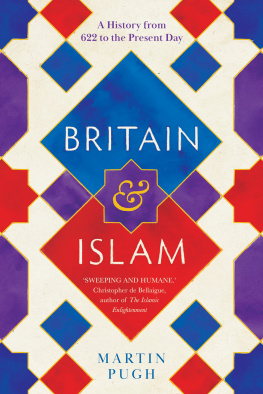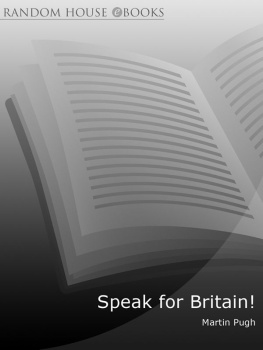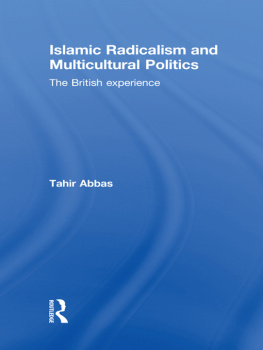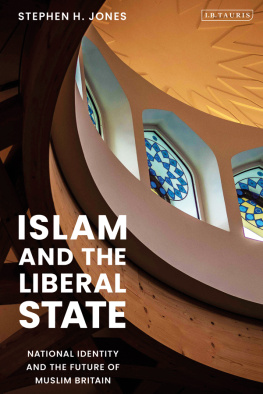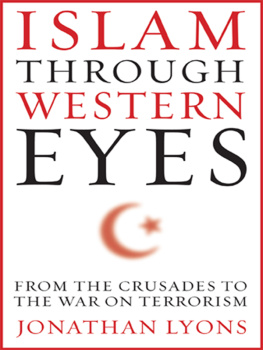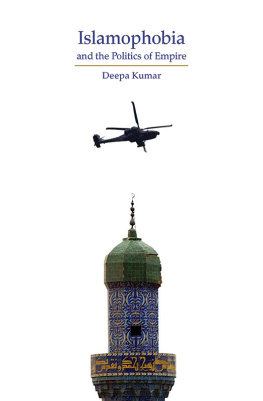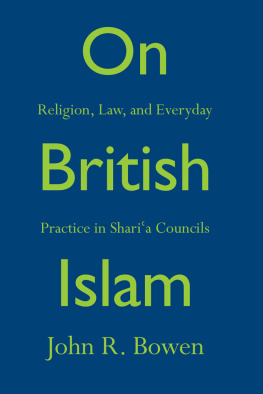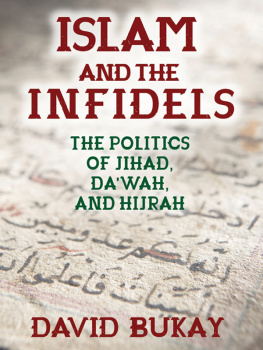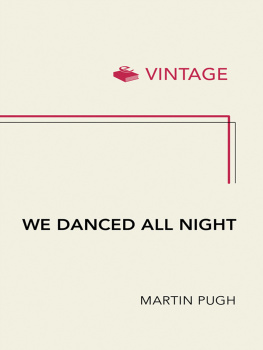BRITAIN AND ISLAM
BY THE SAME AUTHOR
Electoral Reform in War and Peace 19061918
The Making of Modern British Politics 18671945
The Tories and the People 18801935
Lloyd George
Women and the Womens Movement in Britain Since 1914
State and Society: British social and political history since 1870
Storia Della Gran Bretagna 17891990 (Britain Since 1789: A concise history)
The March of the Women: A revisionist analysis of the campaign for womens suffrage 18661914
A Companion to Modern European History, 18711945 (editor)
The Pankhursts: The history of one radical family
Hurrah for the Blackshirts!: Fascists and fascism in Britain between the wars
We Danced All Night: A social history of Britain between the wars
Speak for Britain! A new history of the Labour Party
Britain: Unification and disintegration

Copyright 2019 Martin Pugh
All rights reserved. This book may not be reproduced in whole or in part, in any form (beyond that copying permitted by Sections 107 and 108 of the U.S. Copyright Law and except by reviewers for the public press) without written permission from the publishers.
For information about this and other Yale University Press publications, please contact:
U.S. Office:
Europe Office:
Set in Adobe Garamond Pro by IDSUK (DataConnection) Ltd
Printed in Great Britain by TJ International, Padstow, Cornwall
Library of Congress Control Number: 2019941058
ISBN 978-0-300-23494-7
A catalogue record for this book is available from the British Library.
10 9 8 7 6 5 4 3 2 1
To Fran, Hannah and Alastair
CONTENTS
ILLUSTRATIONS
PREFACE
Apparently England is ever forgetting that she is at present the greatest Mohammedan empire in the world.
The words of the Victorian traveller-explorer, Sir Richard Burton, in the introduction to his translation of The Arabian Nights (1886) echo uncomfortably down the decades. Between 1947 and the 1970s, the British abandoned their empire in a remarkably short space of time and, on the surface, with surprisingly little trauma or controversy among the general public at least. But there was a downside: they never mourned its passing, forgot all about it during the 1950s, and later found it hard to come to terms when the empire came home to them. Loss of empire is only one of the many respects in which British national identity has unravelled during the last 40 or 50 years. The British relationship with Muslims has been one of the casualties. In 2017, many British mosques found it expedient to declare an open day, designed to encourage the public to come in and learn a little about Islam. But this is a sad reflection of the fact that today the whole subject is clouded by an immense amount of ignorance, misconception and prejudice. The worst symptoms of this are the regular misrepresentations of Muslims in the popular press, the tendency to blame all Muslims for the faults of a few, the publication of Islamophobic books about the supposed subversion of Europe, and the survival of UKIP as an anti-Muslim party.
Against this background this book is unashamedly educational, intended as a corrective to prejudice; it is aimed at a general audience, and especially a non-Muslim audience, in the hope of getting things into perspective. It is often argued that history does not repeat itself; but it would be more accurate to say that it does not repeat itself exactly. No one, looking at successive invasions of Afghanistan by the British twice in the nineteenth century and by the Russians and Americans in the twentieth and twenty-first, can fail to see the same cycle being repeated by politicians ignorant of history. In Britain, the anti-Muslim propaganda of the medieval Crusades was resurrected in Victorian times under the influence of the Evangelical revival and the needs of politicians like W.E. Gladstone, who painted shocking caricatures of Muslims and especially Turks. More recently, the Victorian concerns about Islam as an obstacle to progress have been revived as the conflict-of-civilisations thesis by foolish American presidents and academics and repeated by several ignorant British prime ministers. We were even entertained to a faint echo of the Victorian propaganda during the EU referendum campaign, when Boris Johnson tried to scare voters with the claim that some 70 million Turks were about to obtain membership of the community!
The troubled relations between Islam and the West have inspired others to delve into the subject for example, in the American context with Whats Right with Islam? (2004) by Imam Feisal Abdul Rauf. I have found this approach stimulating, because from a British perspective it does not seem particularly plausible. It is a very American book, which starts from the assumption that Americas gift to the world is liberal capitalism, and consequently gives no thought to the idea that Islam is arguably closer to socialism than to capitalism! The author even characterises American society as a modern manifestation of the Abrahamic ethic, which seems to stretch things rather far. His claim that US society is Islamic does remind one of its religiosity, which is so unusual for an advanced Western country. By contrast, Europe has largely emancipated itself from religion and Britain has become an especially secular society. This may be helpful, in the sense that it is comparatively easy for Muslims to retain their own values, while also adapting to British habits and traditions; but it is also a complication, in that it gives grounds for those who purport to defend Britishness by championing Britain as a Christian country under threat from a resurgent Islam.
In the first instance, this book is a modest attempt to explain how radically British relations with Muslims have fluctuated over the 1,400 years since the foundation of Islam: from the fanatical propaganda associated with the Crusades, to the pragmatic collaboration with Muslim states inspired by the Protestant Reformation, the appreciation of the extensive common ground between Islam and Christianity in the eighteenth century, and Britains pose as a defender of Islam (in the shape of the Ottoman Empire) by the early nineteenth century.
In particular, we need to recognise what an extremely long record Britain has of interference in the Islamic world, in terms of rearranging its boundaries in India, Pakistan, Bangladesh, Iraq, the Ottoman Empire, Jordan, Palestine, Lebanon, Egypt and Sudan, as well as attempting to control its policies and change its rulers. As a result, we have acquired over two centuries a dangerous addiction for meddling in Muslim countries which has almost always proved to be counter-productive. The habit is very much alive today among politicians, diplomats and experts, and is responsible, at least in part, for modern domestic terrorism.
Historical perspectives also help to correct the obvious misperceptions about Islam. Today we are understandably obsessed with what is a very limited part of Islam in several countries of the Middle East and North Africa. Yet the biggest Muslim country in the world is Indonesia, notable for its relaxed approach to religion and its democratic practice. The book also gives much attention to India. We should remember that when Richard Burton referred to Britain as a great Muslim power, he was thinking of India, where, in the eighteenth century at least, the British fell in love with Muslims. Even today, independent India with approximately 200 million Muslims is one of the worlds largest Muslim societies, yet it does not figure as prominently in discussions about Islam as it should. As a result, Islamophobes tend to overlook the fact that so far from Islam being incompatible with democracy, for over 60 years Indian Muslims have been practising liberal democracy.
Next page
